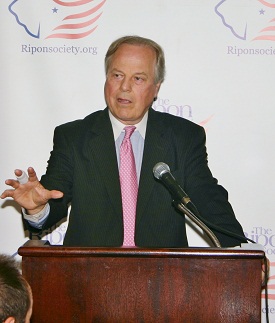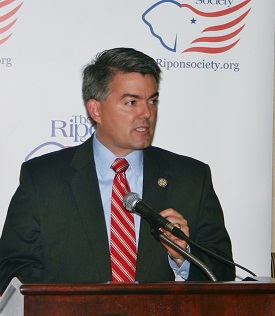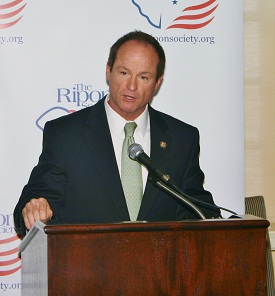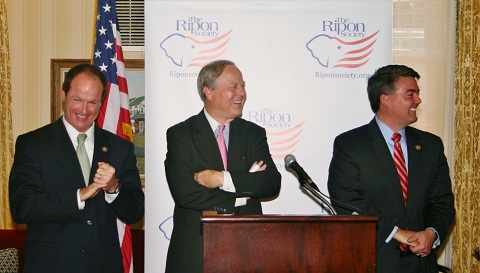
WASHINGTON, D.C. – The Chairman and two Members from the House Energy & Power Subcommittee appeared before a Ripon Society policy breakfast yesterday morning to discuss the importance of the energy sector in job creation and why the U.S. must maximize domestic production in addition to pursuing alternative sources of fuel.
The Members participating in the Ripon Society policy discussion were: Congressman Ed Whitfield (KY-1), the Chairman of the Energy & Power Subcommittee; Congressman John Sullivan (OK-1), the panel’s Vice Chairman; and, Congressman Cory Gardner (CO-4), who is in his first term on the Subcommittee and, in his opening remarks, discussed what brought him to Washington last year.
“I ran for Congress because I believe that government needs to get out of the way and let America work,” the Freshman stated. “And if we’re going to get back to this notion of an energy policy that is abundant and affordable, then we have to do that again — get government out of the way … Energy isn’t a cost just paid by just a few. It’s a cost that is paid by every single one of us. From the poorest to the wealthiest. To power our homes, to power our businesses, and to make our lives better. But what are we doing about it? I think that’s the most exciting thing.

“Yesterday, we introduced a bill — the Domestic Energy and Jobs Act – which is a combination of about seven pieces of legislation that will dramatically increase domestic energy production. I have one title in the bill. It says simply this: If the President believes we are in an emergency situation that is dire enough to require accessing the Strategic Petroleum Reserve, then we need a long term policy solution as well. If you brought down the Reserve by five percent, then it requires an increase in permitting on federal lands by five percent as well — moving from a quick-fix political decision to a long-term policy solution.
“The bottom line is we have an opportunity to increase domestic energy production. We’ve seen it in wind, we’ve seen it in oil, we’ve seen it in natural gas; the technologies that we can drive, the solutions that we can bring. But the problem we face is whether or not our government – the regulatory environment – will allow that innovation to continue. If you look at the success that has taken place in natural gas, 10-15 years ago nobody knew the resource we had domestically. Nobody knew the size of what we could accomplish. Unfortunately, because of that success, we’ve seen a lot of attacks on it as well. And so, we have to make sure we’re doing everything we can do to provide our country with policy we need to drive jobs, to power our economy, and there’s no industry better suited to power our economy like the energy industry.”
Sullivan echoed Gardner’s remarks, and offered up his own views on the subject, as well.
“We need to look at our refining capacity,” the Oklahoma Republican stated. “We need to look at natural gas. We need to look at an all-the-above strategy in which we use oil, coal, and natural gas. And yes, we need to look at alternative energy sources, too. Let’s face it — wind and solar aren’t there for us yet. It’s very expensive. That’s not to say that we shouldn’t research and develop it. Let free enterprise work on it. Someday it may be viable. But you know what? We can’t shoot the horse we’re on now until we have one to get on.
“Coal is a cheap energy source. It’s abundant and always going to be there. It’s not going to leave — we need it. This country — this economy — runs on cheap energy. That’s what gives us a competitive advantage. A lot of coal and natural gas companies are saying, ‘Heck, I’m going to export my product.’ I don’t blame them. If our government won’t let them use it here, they should be able to export it. Because you know China is scouring the world for resources right now. How idiotic would it be for us not to use our own resources here? What are we, a third-world country? We don’t want to do that. So we need to work on an energy policy that lets us be self-sufficient.
 “One of the biggest things I hear when I go around the country, or in my state, is people asking, ‘What are you going to do to create jobs in America?’ I always tell them, ‘Nothing, I’m not going to do a thing to create jobs. But what we can do is get out of the way.’ There’s a lot of money out there. But it’s a coward — it goes toward the least-resistant path, not the most resistance with all the regulatory burdens. We can lessen some of these burdensome government regulations, like streamlining the permit process in the Gulf and making sure the permitorium is lifted. Oil production in the Gulf — from which we get about 30 percent of our oil give or take in the outer continental shelf — is down to 14 percent. That’s not that good. When one of those rigs leaves out there, it takes a lot of jobs with it. We can’t snap our fingers when gas prices go up and bring them back in. So we need to treat energy policy like a Manhattan Project. We need to make sure we solve it. We need to become energy self-sufficient by the year 2020, and we can do that if we come together with a comprehensive plan.”
“One of the biggest things I hear when I go around the country, or in my state, is people asking, ‘What are you going to do to create jobs in America?’ I always tell them, ‘Nothing, I’m not going to do a thing to create jobs. But what we can do is get out of the way.’ There’s a lot of money out there. But it’s a coward — it goes toward the least-resistant path, not the most resistance with all the regulatory burdens. We can lessen some of these burdensome government regulations, like streamlining the permit process in the Gulf and making sure the permitorium is lifted. Oil production in the Gulf — from which we get about 30 percent of our oil give or take in the outer continental shelf — is down to 14 percent. That’s not that good. When one of those rigs leaves out there, it takes a lot of jobs with it. We can’t snap our fingers when gas prices go up and bring them back in. So we need to treat energy policy like a Manhattan Project. We need to make sure we solve it. We need to become energy self-sufficient by the year 2020, and we can do that if we come together with a comprehensive plan.”
Chairman Whitfield agreed with his Vice Chairman about the need to maximize domestic energy production, and said his Subcommittee will continue to work toward this goal — with or without the President’s support.
“As we approach this election, I think the responsibility we have is to continue to pass legislation and set up a contrast between the policies we’re advocating and the policies of the President. The reason I think the President is in serious trouble across the country is because I think he squandered a great opportunity. It all started with Rahm Emanuel. He said after the election, ‘It’s a shame to let a crisis go to waste.’ He was talking about how they were going to use the recession and slow economy to pursue their political goals. What they ended up doing was taking the stimulus funds – and as you know, our federal debt has increased by $5 trillion in the short period of time Barack Obama has been President – they took that fund and used it as a slush fund in many ways. They funneled money into green energy projects. We all recognize that green energy has a role to play.

“But to use that amount of money for things like Solyndra, Fisker and Tesla Automotive — even if those cars are produced, their price is $200,000 — I don’t think this President is showing a lot of concern for the average American, funneling money the way he has. To claim that his administration is going to be revolutionary and more ethical in recent memory, and then funnel $538 million to Solyndra … This President talks a good game, then he goes back and his administration does another. If we are going to create a strong economy in America again — which we know we can do — energy is going to play a vital role in that.
“We know the base load is going to have to be dependent on fossil fuel. We’re developing technology and do have other opportunities to explore energy sources. But when we go home to our districts, we talk to folks who don’t have jobs. We talk to people who want to invest money. We talk to people who want certainty in regulations and economic policy. And they really feel adrift — that this government is working against them instead of trying to help them, for the simple purpose that this government is pursuing its own political goals more than trying to stimulate the economy.”
The Ripon Society is a public policy organization that was founded in 1962 and takes its name from the town where the Republican Party was born in 1854 – Ripon, Wisconsin. One of the main goals of The Ripon Society is to promote the ideas and principles that have made America great and contributed to the GOP’s success. These ideas include keeping our nation secure, keeping taxes low and having a federal government that is smaller, smarter and more accountable to the people.



